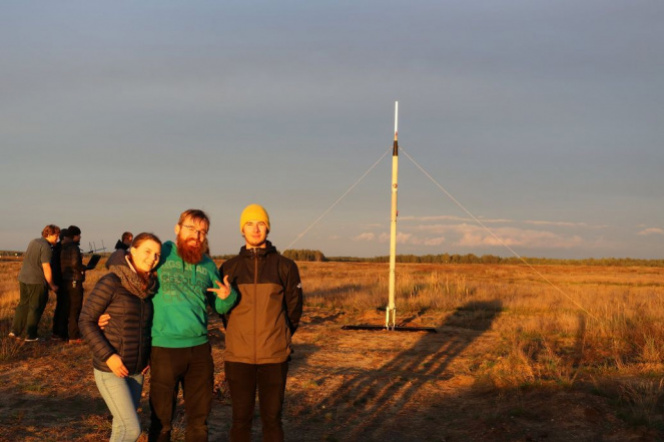Date added: 2021-09-29
Debut of students' new rocket in a prestigious contest. SimBa will soon fly to Portugal

EuRoC – European Rocketry Challenge is a rocket competition held between 11-17 October in Portugal. 400 students from all over Europe will attend. Amongt them there will be a team representing Gdańsk Universty of Technology, competing in 3km category. The preparations are in their final stage.
Hours spent in the labs
During the competition, the rocket has to launch and reach the altitude of three kilometers. This is the reason why the students spend hours and hours of hard work in Protolab I and Protolab II laboratories. With the advanced and modern equipment available in the labs the students can not only design but, most of all, build the rocket.
In the construction of the R5 rocket which will participate in European Rocketry Challengee 3D PLA and PETG printing technologies were applied to prototype parts with complicated geometry or parts that are not exposed to high loads. Building the body structure, the students also used glass and carbon composites. The parts also include aluminium elements produced by means of machining and turning. These parts were mainly used to build the key elements of the engine, body joints and recoverable parts. One should also mention textolite and graphite. Milled textolite was used as thermal insulation of the engine, while graphite was turned to make the engine nozzle.
You can watch a video of R5 engine test below.
Other competitions
Rockets built by the students of our University have been proved during Experimental Rocket Flights or Meteor Festival, however, the team's main objective consists in international competitions - EuRoC mentioned above and Spaceport America. Spaceport America is the most prestigious competition for students' rockets. It is held annually in New Mexico USA and gathers up to 150 teams representing 18 countries. SimBA project was qualified for participation in 2020 and 2021 editions.Unfortunately, due to the pandemics, the former was cancelled and the latter had a remote formula. 2022 seems to be very promising - in June students are planning to go to the USA and compete in the category of self-made liquid fuel/hybrid engines and to reach the ceiling of 3048 m.
Five constructed rockets
SimBa project was initiated in 2017/2018 academic year as a spin-off of baloon project Stardust. Its objective consists in building low-altitude rocket vehicles. The team completed 5 rockets already and a number of successful launches and - what is even more important - landings. First vehicles: R1, R2, R3 were aimed at active flight control. During the last mission, R4 rocket vehicle reached the altitude of 2963 meters at maximum velocity of 780 km/h. R5 rocket - as we have already mentioned - will soon make its debut in EuRoC competition.
Watch the video showing the launch of R4 rocket vehicle:
The team involved currently in SimBA project numbers 20 members representing the Faculty of Mechanical Engineering and Ship Technology, Faculty of Electronics, Telecommunication and IT, Faculty of Electrical and Control Engineering, Faculty of Chemistry and Faculty of Economy and Management, supported by colleagues from Gdańsk University of Medicine and Higher Banking School in Gdańsk. The students are dividied into smaller groups: engine, construction, CFD, recovery, payload and electronics. Key process is the proper integration of all the components.
SimBA project team is supported by Polish Rocket Society, Space Forrest, Excento, or IMP PAN and Gdańsk Science & Technology Park. The students also benefit from PLUTONIUM grant realized at GUT.
More information about the project can be found at the SimLE facebook profile and website.



